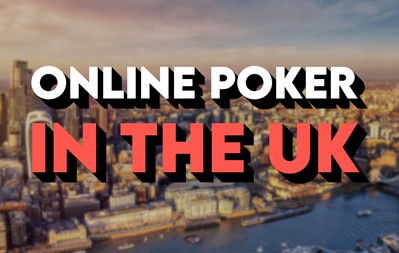Best UK Online Poker Sites
Last updated: April 16, 2025
- 100% up to $600
- Bonus available on one or across multiple deposits
- Unlock $1 for every $5 in rake paid
- 100% up to £400
- £40 in Free Play – claim here
- Pick your bonus
- 100% up to £1,000
- £50 in free play for new players
- £25 PartyPoker Tour Path Round 4 Ticket
- £200 playthrough bonus
- £20 extra with first deposit
- Filled with recreational players
 Online poker is very popular in the UK. The market is one of the largest and as such, there are many online poker sites operating in the country, giving players plenty of choice in terms of bonuses, promotions, stakes, game types, and more.
Online poker is very popular in the UK. The market is one of the largest and as such, there are many online poker sites operating in the country, giving players plenty of choice in terms of bonuses, promotions, stakes, game types, and more.
But not all UK poker sites have been created equal. The country features a strictly regulated market, requiring operators to acquire a license from the United Kingdom Gambling Commission (UKGC). We recommend sticking to these licensed sites at all times.
On this page, we cover everything there is to know about online poker in the UK. You will find recommendations for the best and most reliable poker sites, the best bonuses, an explanation of the current legal situation, and much more.
Whether you are new to online poker or simply want to learn more about the UK poker scene, you have come to the right place!
The Best UK Poker Sites
There are many poker sites operating in the United Kingdom, which makes the task of finding the best ones difficult. To help you find the way, we have come up with a few top picks that tick all the important boxes.
First and foremost, all these sites are licensed by the UKGC. This makes them completely legal and very trustworthy, as the UKGC is one of the strictest regulatory bodies out there. When playing here, you can rest assured your money is safe and the games are fair.
Beyond this, these are also some of the best and biggest poker sites in the industry. They offer a great variety of games and stakes, excellent player traffic, big tournament guarantees, generous welcome bonuses, exciting promotions, and top-notch software and mobile apps.
GGPoker UK
 A top-tier online poker site, GGPoker, has acquired a necessary license from the UKGC, and it is our top picks for safe and legal UK online poker options.
A top-tier online poker site, GGPoker, has acquired a necessary license from the UKGC, and it is our top picks for safe and legal UK online poker options.
Unlike PokerStars, GGPoker UK doesn’t allow players to maintain their balances in GBP. While it is possible to make a deposit using the local currency, it is immediately converted to USD. Other than this, however, the site certainly has a lot to offer.
GGPoker UK features a generous welcome bonus, a great range of cash game tables, and a rich tournament schedule, from daily events to major series with big guarantees.
PokerStars UK
 PokerStars is one of the biggest names in online poker and also one of the best picks for UK poker players. Licensed and regulated by the UKGC, PokerStars UK offers a modern and safe platform that caters to players of all shapes and sizes.
PokerStars is one of the biggest names in online poker and also one of the best picks for UK poker players. Licensed and regulated by the UKGC, PokerStars UK offers a modern and safe platform that caters to players of all shapes and sizes.
The site is best known for its massive tournaments with big guarantees, and you can find these across all stakes, with buy-ins as low as £1. The room also offers a variety of live event satellites, many of which are located in the United Kingdom.
What’s more, you can make deposits and maintain your cashier balance in GBP, which makes your bankroll management easier. The operator also used to offer games in GBP, but these were removed, so your balance is converted to the relevant currency when buying into the game (EUR or USD).
PokerStars UK offers two welcome bonuses for new players, so you can take your pick:
- A 100% match up to £400 – use the bonus code 'STARS400’ to claim this offer
- £40 in Free Play on a deposit of just £10 – use the code 'SPIN’ to get this bonus
PartyPoker UK
 PartyPoker is one of the largest brands in the online poker world, offering fully licensed and regulated site catering to UK players.
PartyPoker is one of the largest brands in the online poker world, offering fully licensed and regulated site catering to UK players.
Although a smaller poker room than some of its main competitors, PartyPoker brings a lot to the table, with softer games, a very solid tournament schedule catering to all bankrolls, and a variety of regular competitions and challenges to boost your bankroll.
Recently, the operator got back into the live poker scene with its PartyPoker Tour playing out across the United Kingdom and offering a variety of very affordable online satellites to these events.
The welcome offer at PartyPoker UK consists of a 100% match up to £1,000, £50 in free play, and a £25 ticket for the PartyPoker Tour Path Round 4.
888poker UK
 One of the longest-standing brands in the iGaming industry, 888poker UK is another top choice for players in the country. In fact, 888poker features special, improved bonuses for UK players, demonstrating just how much they value this particular market.
One of the longest-standing brands in the iGaming industry, 888poker UK is another top choice for players in the country. In fact, 888poker features special, improved bonuses for UK players, demonstrating just how much they value this particular market.
While the player traffic isn’t as good as with the other two operators, the site offers softer games across the board and offers an interesting tournament schedule.
For example, 888poker UK features an excellent selection of Mystery Bounty tournaments, offering several of these on a daily basis, making the platform a perfect pick for anyone interested in this particular format.
It is also worth noting that 888poker features many satellites for live events happening in the United Kingdom, so if this happens to be your cup of tea, you’ll feel right at home here.
Unibet Poker UK
 Unibet is a well-known name in the world of online gambling. Although focused primarily on sports betting, the operator also offers a poker room that’s fully licensed and regulated by the UKGC.
Unibet is a well-known name in the world of online gambling. Although focused primarily on sports betting, the operator also offers a poker room that’s fully licensed and regulated by the UKGC.
Unibet Poker is a great option for recreational players as the platform is fully geared toward providing a relaxed gaming experience. The maximum number of tables you can play on is limited and the software features a fun design that looks great but isn’t quite suited for professional players.
On the other hand, Unibet Poker UK offers some of the softest games around, which makes him a nice addition to the grinding schedule for more serious players.
Best UK Online Poker Bonuses & Promotions
UK online poker players get to enjoy some of the best poker bonuses and promotions around. Since the UK is seen as a very valuable market, operators compete to provide valuable offers for the players to get them to join and stick around.
Valuable Welcome Offers
When it comes to welcome bonuses, UK poker players get all the good stuff. Quite often, sites will offer substantial “No Deposit” bonuses to new players, allowing you to get started without investing any of your own money.
In terms of deposit bonuses, these are at least as good as what players from other parts of the world are getting, but UK customers often get additional perks like special tournament tickets or some free funds to go along with the deposit match.
Generous Reload Offers
Looking to keep the existing players on their platform, UK poker sites also offer generous reload bonuses. While these aren’t as big as welcome offers, they often come quite close, giving you additional reasons to stick around or come back to a site where you played before.
What’s particularly good about UK online poker bonuses is that they come with very clear and concise terms and conditions. The UKGC requires this from all licensed operators, and you, as a player, will know exactly what to expect from a bonus offer and will be able to gauge its real value.
Leaderboards & Competitions
UK online poker players get to participate in all sorts of leaderboards and competitions hosted by the operators. Some of these are targeted at UK players only, while others are open to all players on the site.
Either way, getting involved with these is always a good idea. It usually doesn’t cost any extra money, and players only need to opt-in to participate. So, you often don’t have to do anything else but play your favorite game format to have a shot at additional prizes.
How to Play Online Poker in the UK
To get started with UK online poker, you only need to complete a few simple steps, and you’ll be ready to join the action.
- Pick a UK-licensed poker site you like, like PokerStars, GGPoker, or Unibet Poker
- Visit the site
- Find the registration link and click on it
- Fill in your details
- Check your email for the verification link
- Download the software & log in with your account details
- Make a deposit or pick up your no deposit bonus to get started
| Online Poker in the United Kingdom | |
|---|---|
| 📢 Status | Legal and Regulated! |
| 🗺 Ring-fenced market? | No |
| 🔥 Top UK Poker Sites | PokerStars UK, GGPoker Poker UK, 888poker UK, Unibet Poker UK |
| 🏆 Best UK Tournaments | PokerStars WCOOP, PokerStars SCOOP, GGPoker WSOP Online |
| ⚖️ Regulated By | United Kingdom Gambling Commission (UKGC) |
| 🔞 Legal Age to Gamble | 18+ |
UK Online Poker Laws and Regulation
The Gambling Act of 2005 revolutionized online gambling in the UK, and its scope extends to online poker. In accordance with the Act, all poker sites in the UK must acquire a license from the United Kingdom Gambling Commission (UKGC).
The UKGC is the main regulatory body in the country that not only issues licenses but is also in charge of overseeing the licensed operators to ensure they conform with relevant laws in their business practices.
Although sites have to be licensed on a local level, the United Kingdom isn’t a segregated market (unlike other European markets like Spain or Italy). This means that UK players get to play in a combined pool with players from other European and rest-of-the-world (ROW) countries.
It is worth noting that some poker sites in the UK continue to operate without a UKGC license. While it is not illegal for players to play on these sites, doing so significantly increases your risks, as you’re not protected by the regulator, and these sites often have very little internal oversight when it comes to game fairness.
With all that in mind, sticking to UKGC-licensed and approved UK poker sites is always your best choice by far. Many of these sites are also among the industry leaders, which further adds to their trustworthiness and reliability.
UK Online Poker & Taxes
Gambling winnings aren’t taxed in the United Kingdom, and this applies to online poker winnings as well. Everything you win playing on the sites licensed by the UKGC is entirely yours to keep, and you don’t have to pay any taxes on these winnings.
This may not be the case when playing on offshore, unregulated sites. While the situation isn’t 100% clear here, it is possible that you will be liable for taxes if your winnings result from a play on a site not regulated by the UKGC.
This is yet another reason to stay with licensed UK poker sites and avoid any unnecessary complications or additional costs that are easy enough to avoid.
Banking at UK Online Poker Sites
Online poker sites in the UK make it very easy for players to make deposits and withdraw their winnings. You will find a great range of popular payment options across the sites, and this applies particularly to the big ones like PokerStars UK and GGPoker UK.
In line with very strict laws, all UKGC-licensed sites only work with trustworthy payment processors, so you can always rest assured your sensitive personal info is treated with the utmost care and your money is handled with great care.
Under UK regulations, every site must tell customers how their funds are protected. The highest grade — high protection — means that funds are kept in a separate trust, so that even in the case where a business shuts down and goes through liquidation, player deposits are protected from the bankruptcy proceedings. We have a dedicated guide to UK player fund protection to learn more.
When it comes to supported payment options, these are the ones you’ll come across at a majority of UK online poker rooms:
- Visa (debit)
- MasterCard (debit)
- PayPal
- Neteller
- Skrill
- Paysafecard
It is important to note that credit cards cannot be used for online poker payments in the UK. The country instituted this restriction as a part of increased responsible gambling measures, looking to prevent people from spending money they don’t actually have.
UK Poker Sites Withdrawals
Withdrawing money from UK poker sites is quick and easy once your account is fully verified. Depending on your selected payment option, you can expect to receive your funds within a few hours (when using e-wallets) and up to a few days (when withdrawing back to a card or to your bank account).
However, new players are often subject to scrutiny by poker operators, and the verification process can be more demanding than in most other jurisdictions.
In addition to having to verify your personal info (name, surname, address, DOB), you might be required to produce what’s known as the “source of wealth.” This can entail operators asking you for documents to confirm you have enough income to support your gaming habits.
The topic of “source of wealth” verifications has been the cause of some controversy, as sometimes players are required to send their bank statements and bank slips despite their deposits being very low. There are no steadfast rules as to when and why an operator can make this request, so it’s something to keep in mind.
Luckily, these checks seem to be more present at online casinos and sportsbooks, so UK online poker players don’t have to worry about them too much.
UK Online Poker FAQ
Who regulates online poker in the United Kingdom?
Online poker in the UK is regulated by the United Kingdom Gambling Commission (UKGC), and we recommend players stick to the sites licensed by the UKGC.
Is it safe to play online poker in the UK?
As long as you play on the sites approved by the UKGC, online poker in the UK is very safe. These sites have to adhere to very strict regulations that ensure safety, fairness, and high levels of protection for players and their funds.
How good are UK online poker bonuses?
UK poker players get to enjoy some of the best bonuses around. From no-deposit offers to generous match bonuses, you’ll find plenty of great promotions to keep your bankroll topped up.
Do any of the UK poker sites offer no deposit bonuses?
Yes, there are several no deposit bonuses available to UK poker players. These offers change frequently, so you should do your own research, but you should have no problems picking up some no deposit funds as a new customer at a UK online poker room.
Are UK poker players segregated from other online poker players?
No, there is no segregation of players at UK poker rooms. While operators are required to obtain a local license, they do not have to segregate UK players from other European and ROW markets.
What deposit options can I use with UK online poker rooms?
Poker sites in the UK accept a variety of payment options, including major debit cards like Visa and MasterCard, e-wallets such as NETELLER, PayPal, and Skrill, and prepaid vouchers like Paysafecard. However, credit cards cannot be used for deposits.




